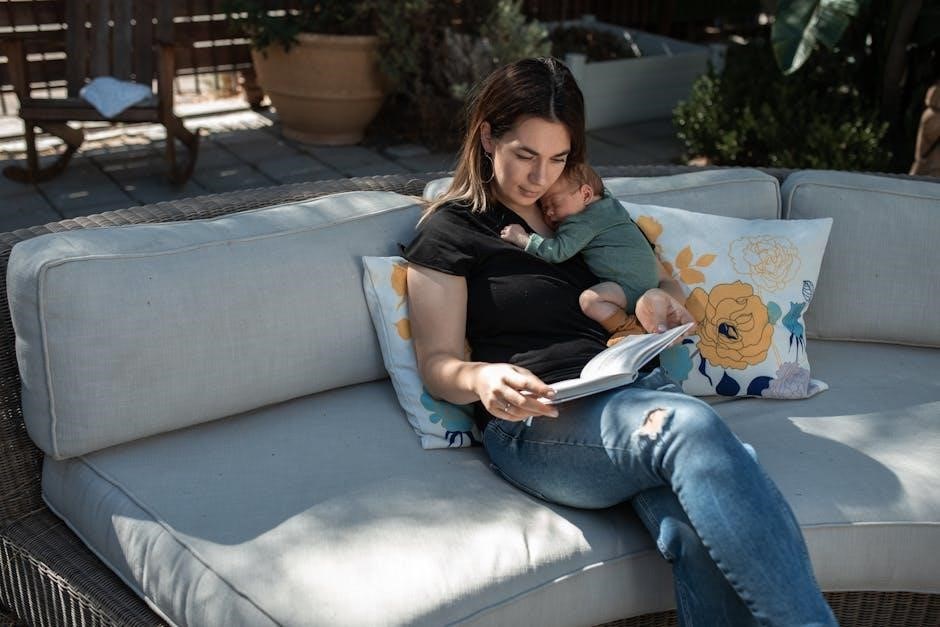
daycare contract pdf
A daycare contract is a legally binding agreement between parents and providers, outlining responsibilities, payment terms, health protocols, and termination clauses. It ensures clarity and protection for both parties, providing a structured framework for childcare services.

Key Elements of a Daycare Contract
A daycare contract outlines services, payment terms, health protocols, termination clauses, and communication expectations. It ensures both parties understand their responsibilities and provides legal protection, fostering a professional and structured childcare arrangement.
2.1 Parties Involved


The daycare contract clearly identifies the parties entering into the agreement. This typically includes the daycare provider or facility and the parent or legal guardian of the child. The provider is responsible for delivering childcare services, while the parent is obligated to adhere to the terms, including payment and communication. In some cases, the child may also be referenced, especially if they are of legal age to sign certain provisions. The contract should outline the legal names, addresses, and contact information of all parties to ensure clarity and accountability. Defining the roles and responsibilities of each party helps prevent misunderstandings and establishes a professional relationship. This section is crucial for ensuring both the provider and the family understand their obligations and expectations. It also serves as a legal foundation for resolving disputes or addressing breaches of the agreement. Clear identification of parties is essential for the enforceability of the contract.
2.2 Services Provided

The daycare contract outlines the specific services provided by the facility. This includes the hours of operation, the age range of children accepted, and the type of care offered, such as full-time, part-time, or drop-in services. The contract may also detail the activities, meals, and snacks provided, as well as any additional programs like educational enrichment or extracurricular activities. It is important to specify the level of care, such as infant, toddler, or after-school programs, to ensure clarity. The services section may also address pickup and drop-off procedures, late pickup policies, and any restrictions on care, such as handling special dietary needs or medical conditions. This section ensures that parents understand what is included in the care and what may require additional arrangements or fees. By clearly defining the services, the contract helps set expectations and avoids misunderstandings. It also emphasizes the daycare’s commitment to providing a safe, nurturing environment for children.
2.3 Payment Terms

The daycare contract outlines the payment terms to ensure clarity and mutual understanding. This section typically includes the payment schedule, such as weekly, bi-weekly, or monthly payments, and the accepted methods of payment, like checks, credit cards, or digital transfers. It may also specify the due dates for payments and any late fees or penalties for missed payments. The contract may include a grace period for late payments and the consequences of repeated late payments, such as termination of services. Refund policies are often addressed, detailing under what circumstances refunds are available, such as withdrawal of the child with proper notice. Some contracts may include clauses for prorated payments if enrollment begins or ends mid-payment period. Additionally, the contract might outline any additional fees for extra services, such as extended hours or special activities. The payment terms are designed to protect both the daycare provider and the parents by establishing clear financial expectations and responsibilities. This section ensures transparency and accountability in the financial aspect of the agreement. Proper documentation of payment terms helps prevent disputes and ensures a smooth operation of the daycare services. By clearly defining payment obligations, the contract fosters a professional and trustworthy relationship between the parties involved.
2.4 Health and Safety Protocols
The daycare contract must detail the health and safety protocols to ensure the well-being of the children. This section outlines the measures the daycare will take to maintain a safe environment, such as sanitation practices, proper handwashing, and cleaning schedules. It may also include policies on administering medication, handling allergies, and managing illnesses or injuries. The contract often specifies the steps to be taken in case of emergencies, such as fires or natural disasters, including evacuation plans and first aid procedures. Additionally, it may address vaccination requirements for staff and children, as well as protocols for isolating sick children to prevent the spread of illness. The contract may also require parents to notify the daycare of any health concerns or allergies their child may have. By clearly defining these protocols, the contract ensures that both the daycare and parents are aligned on maintaining a healthy and safe environment for all children. This section is crucial for building trust and ensuring the safety of the children in care. Proper documentation of these protocols helps prevent misunderstandings and ensures compliance with health and safety standards. The contract may also outline the role of staff in monitoring and reporting any health or safety issues promptly.
2.5 Termination Clause

The termination clause in a daycare contract outlines the conditions under which either party can terminate the agreement. This section typically includes the notice period required for termination, which can range from 30 to 90 days, depending on the terms agreed upon. It also specifies the circumstances that may lead to immediate termination, such as non-payment of fees, violation of contract terms, or unsafe behavior by either party. The clause may detail the process for providing written notice and the effective date of termination. Additionally, it may address the handling of refunds or payments due at the time of termination. The termination clause ensures both parties understand their rights and obligations if the agreement is ended. It is essential to clearly define these terms to avoid disputes and ensure a smooth transition if the contract is terminated. Proper documentation of this clause helps protect both the daycare provider and the parents legally. The contract may also specify how the termination will affect the care provided to the child during the notice period. This clause is designed to provide clarity and fairness in ending the agreement. By outlining the termination process, the contract ensures that both parties are informed and prepared for any potential changes. The termination clause is a critical component of the daycare contract, as it safeguards the interests of both the provider and the family. It ensures that any termination is handled professionally and ethically, maintaining a positive relationship even after the agreement ends. The clause may also include provisions for resolving disputes that arise during or after termination, ensuring a peaceful resolution. Overall, the termination clause is a vital part of the contract, providing a clear roadmap for ending the agreement if necessary. It helps prevent misunderstandings and ensures that both parties are aware of their responsibilities in the event of termination. The clause is legally binding and must be adhered to by both the daycare provider and the parents. By including this section, the contract remains comprehensive and protects the rights of all involved parties. The termination clause is essential for maintaining trust and ensuring that the transition, if needed, is smooth and respectful. It demonstrates the commitment of both parties to uphold professional standards, even in the event of ending the agreement. The clause serves as a safeguard, ensuring that the termination process is fair and transparent. This section of the contract is often reviewed carefully by both parties to ensure mutual understanding and agreement. The termination clause plays a key role in maintaining a positive and respectful relationship between the daycare provider and the parents, even if the agreement comes to an end; It is a fundamental aspect of the contract that ensures clarity and fairness in all situations. The clause is designed to protect the interests of both parties and provide a clear path forward if termination becomes necessary. By including this section, the contract remains robust and comprehensive, covering all possible scenarios. The termination clause is a critical component that ensures the agreement is fair and legally sound. It provides peace of mind for both the daycare provider and the parents, knowing that their rights and obligations are clearly defined. The clause is a necessary part of the contract, ensuring that any termination is handled with professionalism and respect. It helps maintain trust and cooperation, even in the event of ending the agreement. The termination clause is a vital element of the daycare contract, offering clarity and protection for all parties involved. It ensures that the termination process is smooth and respectful, upholding the professional standards of both the provider and the parents. The clause is essential for maintaining a positive relationship and ensuring that the agreement is fair and transparent. By including this section, the contract remains comprehensive and legally binding, protecting the interests of both parties. The termination clause is a necessary part of the contract, providing a clear roadmap for ending the agreement if needed. It ensures that both the daycare provider and the parents are aware of their responsibilities and rights during the termination process. The clause is designed to prevent disputes and ensure a peaceful resolution if any issues arise. Overall, the termination clause is a critical component of the daycare contract, offering clarity, fairness, and legal protection for all involved. It is essential for maintaining trust and ensuring that the agreement is handled professionally, even in the event of termination. The clause serves as a safeguard, protecting the rights and interests of both parties. By including this section, the contract remains robust and comprehensive, covering all possible scenarios. The termination clause is a fundamental part of the daycare contract, ensuring that the agreement is fair and legally sound. It provides peace of mind for both the daycare provider and the parents, knowing that their rights and obligations are clearly defined. The clause is a necessary part of the contract, ensuring that any termination is handled with professionalism and respect. It helps maintain trust and cooperation, even in the event of ending the agreement. The termination clause is a vital element of the daycare contract, offering clarity and protection for all parties involved. It ensures that the termination process is smooth and respectful, upholding the professional standards of both the provider and the parents. The clause is essential for maintaining a positive relationship and ensuring that the agreement is fair and transparent. By including this section, the contract remains comprehensive and legally binding, protecting the interests of both parties. The termination clause is a necessary part of the contract, providing a clear roadmap for ending the agreement if needed. It ensures that both the daycare provider and the parents are aware of their responsibilities and rights during the termination process. The clause is designed to prevent disputes and ensure a peaceful resolution if any issues arise. Overall, the termination clause is a critical component of the daycare contract, offering clarity, fairness, and legal protection for all involved. It is essential for maintaining trust and ensuring that the agreement is handled professionally, even in the event of termination. The clause serves as a safeguard, protecting the rights and interests of both parties. By including this section, the contract remains robust and comprehensive, covering all possible scenarios. The termination clause is a fundamental part of the daycare contract, ensuring that the agreement is fair and legally sound. It provides peace of mind for both the daycare provider and the parents, knowing that their rights and obligations are clearly defined. The clause is a necessary part of the contract, ensuring that any termination is handled with professionalism and respect. It helps maintain trust and cooperation, even in the event of ending the agreement. The termination clause is a vital element of the daycare contract, offering clarity and protection for all parties involved. It ensures that the termination process is smooth and respectful, upholding the professional standards of both the provider and the parents. The clause is essential for maintaining a positive relationship and ensuring that the agreement is fair and transparent. By including this section, the contract remains comprehensive and legally binding, protecting the interests of both parties. The termination clause is a necessary part of the contract, providing a clear roadmap for ending the agreement if needed. It ensures that both the daycare provider and the parents are aware of their responsibilities and rights during the termination process.
2.6 Communication and Updates

Effective communication is crucial in a daycare contract to ensure clarity and transparency between parents and providers. This section outlines the methods and frequency of communication, such as regular updates about the child’s daily activities, meals, and any issues that may arise. It may specify how parents will be informed about scheduling changes, policy updates, or emergencies. The contract may also detail the preferred communication channels, such as email, phone calls, or a designated app. Additionally, it may include provisions for scheduled meetings or conferences to discuss the child’s progress or address concerns. Both parties should agree to maintain open and prompt communication to ensure the child’s well-being and address any questions or issues promptly. This clause ensures that parents are kept informed and involved in their child’s care, fostering trust and collaboration between families and daycare providers. Regular updates and clear communication are essential for a successful and stress-free daycare experience. The contract should reflect a commitment to maintaining strong lines of communication. This fosters a positive relationship between parents and the daycare center. Effective communication ensures that both parties are aligned and informed, which is vital for the child’s care and development; The contract should specify how and when updates will be provided, ensuring transparency and accountability. This section is designed to promote ongoing dialogue and mutual understanding, which are key to a successful daycare experience. By establishing clear communication protocols, the contract helps prevent misunderstandings and ensures that all parties are informed and engaged. This is especially important for addressing any concerns or changes that may impact the child’s care. The communication clause underscores the importance of teamwork between parents and caregivers in providing the best possible environment for the child. It ensures that both parties are proactive in sharing information and resolving any issues that may arise. This section is a cornerstone of a well-structured daycare contract, ensuring that communication remains open, respectful, and effective throughout the agreement. By including this clause, the contract promotes a collaborative approach to childcare, benefiting both the family and the daycare provider. The emphasis on regular updates and clear communication helps build trust and ensures that the child’s needs are consistently met. This clause is essential for maintaining a positive and productive relationship between parents and the daycare center. It ensures that all parties are informed and involved in the child’s care, fostering a sense of partnership and shared responsibility. The communication and updates section is a vital part of the daycare contract, ensuring that everyone is on the same page and working together for the child’s benefit. It provides a framework for ongoing dialogue, which is critical for addressing the child’s evolving needs and preferences. By establishing clear communication guidelines, the contract helps create a supportive and responsive environment for both families and caregivers. This section is designed to promote collaboration and ensure that the child receives the best possible care. The contract should reflect a commitment to open and honest communication, which is essential for building trust and resolving any challenges that may arise. This clause ensures that parents are kept informed and involved in their child’s daily life at the daycare, which is crucial for their peace of mind. Effective communication also allows the daycare provider to address any concerns promptly and efficiently, ensuring the child’s well-being at all times. The contract should specify the expectations for communication, creating a clear understanding of how and when information will be shared. This helps prevent misunderstandings and ensures that both parties are aligned in their approach to the child’s care. The communication clause is a key component of the daycare contract, fostering transparency and collaboration between parents and providers. It ensures that the child’s needs are met through open dialogue and mutual understanding. By including this section, the contract promotes a positive and cooperative relationship, which is essential for the success of the daycare arrangement. The emphasis on regular updates and clear communication helps build trust and ensures that the child’s care is consistent and high-quality. This clause is vital for maintaining a strong partnership between families and daycare providers, ensuring that the child’s best interests are always prioritized. The contract should reflect a shared commitment to effective communication, which is the foundation of a successful daycare experience. By establishing clear guidelines for communication, the contract helps create a supportive environment where the child can thrive. This section is essential for ensuring that both parents and providers are informed, involved, and aligned in their efforts to provide the best possible care for the child. The communication clause is a critical part of the daycare contract, promoting transparency, accountability, and collaboration. It ensures that all parties are proactive in addressing the child’s needs and any challenges that may arise. By fostering open and respectful communication, the contract helps build a positive and lasting relationship between families and the daycare center. This section is designed to ensure that the child’s care is always a top priority, supported by clear and consistent communication. The contract should specify the methods and frequency of communication, creating a clear framework for keeping parents informed and involved. This helps ensure that the child’s well-being is maintained and that any issues are addressed promptly. The communication clause is a cornerstone of a well-drafted daycare contract, ensuring that all parties are on the same page and working together for the child’s benefit. It promotes a culture of transparency and cooperation, which is essential for a successful daycare experience. By including this section, the contract fosters trust and understanding between parents and providers, ensuring that the child’s needs are met through open and effective communication. This clause is vital for maintaining a positive and productive relationship, allowing both parties to collaborate seamlessly in the child’s care. The contract should reflect a commitment to clear and ongoing communication, which is critical for addressing the child’s evolving needs and preferences. By establishing clear guidelines for communication, the contract helps create a supportive environment where the child can flourish. This section is essential for ensuring that parents are kept informed and involved in their child’s daily life at the daycare, which is crucial for their peace of mind. Effective communication also allows the daycare provider to address any concerns promptly and efficiently, ensuring the child’s well-being at all times. The contract should specify the expectations for communication, creating a clear understanding of how and when information will be shared. This helps prevent misunderstandings and ensures that both parties are aligned in their approach to the child’s care. The communication clause is a key component of the daycare contract, fostering transparency and collaboration between parents and providers. It ensures that the child’s needs are met through open dialogue and mutual understanding. By including this section, the contract promotes a positive and cooperative relationship, which is essential for the success of the daycare arrangement. The emphasis on regular updates and clear communication helps build trust and ensures that the child’s care is consistent and high-quality. This clause is vital for maintaining a strong partnership between families and daycare providers, ensuring that the child’s best interests are always prioritized. The contract should reflect a shared commitment to effective communication, which is the foundation of a successful daycare experience. By establishing clear guidelines for communication, the contract helps create a supportive environment where the child can thrive. This section is essential for ensuring that both parents and providers are informed, involved, and aligned in their efforts to provide the best possible care for the child. The communication clause is a critical part of the daycare contract, promoting transparency, accountability, and collaboration. It ensures that all parties are proactive in addressing the child’s needs and any challenges that may arise. By fostering open and respectful communication, the contract helps build a positive and lasting relationship between families and the daycare center. This section is designed to ensure that the child’s care is always a top priority, supported by
2.7 Confidentiality and Privacy
A daycare contract must include a confidentiality and privacy clause to protect sensitive information about the child, family, and daycare operations. This section ensures that personal data, such as medical records, home addresses, and financial details, are not disclosed to unauthorized parties. The contract should outline the daycare’s commitment to maintaining confidentiality and adhering to relevant privacy laws, such as the Family Educational Rights and Privacy Act (FERPA) or the Children’s Online Privacy Protection Act (COPPA) in the U.S. It may specify how staff are trained to handle confidential information and the measures in place to secure records. Additionally, the clause may address how consent is obtained for sharing information, such as with emergency services or authorized third parties. Parents should be assured that their child’s privacy is respected, and any breaches of confidentiality will result in appropriate actions. This section is essential for building trust and ensuring that both the daycare and families uphold their responsibilities to protect sensitive information. It balances transparency with the need to safeguard personal and private details. Confidentiality is a critical aspect of the daycare contract, ensuring that all parties respect and protect sensitive information. The contract should clearly define what constitutes confidential information and outline the consequences of unauthorized disclosure. This clause also ensures that the daycare complies with local and federal privacy laws, providing an additional layer of protection for families. By including this section, the contract establishes a framework for handling sensitive data responsibly, which is vital for maintaining trust and professionalism in the daycare-provider relationship. Parents can feel reassured knowing that their personal and their child’s information is protected. The confidentiality clause is a fundamental part of the daycare contract, ensuring that privacy is prioritized and respected by all involved. It creates a secure environment for sharing necessary information while minimizing risks of unauthorized access or misuse. This section is designed to protect the interests of both the families and the daycare center, fostering a relationship built on trust and accountability. By addressing confidentiality and privacy, the contract ensures that all parties are aware of their obligations to safeguard sensitive information. This is particularly important in a daycare setting, where vulnerable individuals are involved. The contract should specify how confidentiality will be maintained, including physical and digital security measures. It may also outline procedures for reporting and addressing potential breaches. This clause ensures that the daycare center operates with integrity and respect for the privacy of the families it serves. The confidentiality and privacy section is a vital component of the daycare contract, providing clear guidelines for handling sensitive information. It ensures that both the daycare and parents understand their responsibilities in protecting personal data. This section is essential for maintaining a professional and trustworthy relationship, which is critical for the success of the daycare arrangement. By including this clause, the contract addresses a key concern for many parents, offering them peace of mind regarding the security of their information. The confidentiality clause underscores the daycare’s commitment to ethical practices and compliance with privacy laws, further enhancing its reputation and reliability. This section is a cornerstone of the daycare contract, ensuring that confidentiality and privacy are upheld at all times. It provides a clear framework for managing sensitive information, which is essential for building and maintaining trust between families and the daycare center. By addressing confidentiality and privacy, the contract ensures that all parties are held to high standards of integrity and accountability. This clause is designed to protect the interests of both the families and the daycare, fostering a secure and respectful environment for everyone involved. The contract should reflect a strong commitment to safeguarding personal and private information, which is critical in a daycare setting. By including this section, the contract demonstrates its dedication to ethical practices and compliance with relevant laws. This ensures that families can entrust their child’s care to the daycare with confidence in their ability to protect sensitive information. The confidentiality and privacy clause is a fundamental part of the daycare contract, ensuring that all parties prioritize the security and respect of personal data. It creates a foundation of trust and accountability, which is essential for a successful and stress-free daycare experience. By addressing these important issues, the contract provides peace of mind for parents while maintaining the daycare’s professional standards. This section is a key component of the daycare contract, ensuring that confidentiality and privacy are upheld throughout the agreement. It offers a clear and comprehensive framework for managing sensitive information, which is vital for the well-being of both the children and the families involved. The contract should reflect a shared commitment to protecting personal data, ensuring that all parties are aware of their responsibilities. This clause is essential for maintaining a positive and trustworthy relationship between parents and the daycare center. By prioritizing confidentiality and privacy, the contract ensures that the daycare operates with the highest level of integrity and respect for the families it serves. This section is a critical part of the daycare contract, providing assurance that sensitive information is handled responsibly and securely. It addresses a key concern for many parents, offering them confidence in the daycare’s ability to protect their personal and private information. The confidentiality clause is a cornerstone of the daycare contract, ensuring that all parties prioritize the security and respect of sensitive data. It creates a foundation of trust and accountability, which is essential for a successful and stress-free daycare experience. By including this section, the contract demonstrates its commitment to ethical practices and compliance with privacy laws, further enhancing its reputation and reliability. This clause is designed to protect the interests of both the families and the daycare, fostering a secure and respectful environment for everyone involved. The contract should reflect a strong commitment to safeguarding personal and private information, which is critical in a daycare setting. By addressing confidentiality and privacy, the contract ensures that all parties are held to high standards of integrity and accountability. This section is a key component of the daycare contract, ensuring that confidentiality and privacy are upheld throughout the agreement. It offers a clear and comprehensive framework for managing sensitive information, which is vital for the well-being of both the children and the families involved. The contract should reflect a shared commitment to protecting personal data, ensuring that all parties are aware of their responsibilities. This clause is essential for maintaining a positive and trustworthy relationship between parents and the daycare center. By prioritizing confidentiality and privacy, the contract ensures that the daycare operates with the highest level of integrity and respect for the families it serves. This section is a critical part of the daycare contract, providing assurance that sensitive information is handled responsibly and securely. It addresses a key concern for many parents, offering them confidence in the daycare’s ability to protect their personal and private information. The confidentiality clause is a cornerstone of the daycare contract, ensuring that all parties prioritize the security and respect of sensitive data. It creates a foundation of trust and accountability, which is essential for a successful and stress-free daycare experience. By including this section, the contract demonstrates its commitment to ethical practices and compliance with privacy laws, further enhancing its reputation and reliability. This clause is designed to protect the interests of both the families and the daycare, fostering a secure and respectful environment for everyone involved. The contract should reflect a strong commitment to safeguarding personal and private information, which is critical in a daycare setting. By addressing confidentiality and privacy, the contract ensures that all parties are held to high standards of integrity and accountability. This section is a key component of the daycare contract, ensuring that confidentiality and privacy are upheld throughout the agreement. It offers a clear and comprehensive framework for managing sensitive information, which is vital for the well-being of both the children and the families involved. The contract should reflect a shared commitment to protecting personal data, ensuring that all parties are aware of their responsibilities. This clause is essential for maintaining a positive and trustworthy relationship between parents and the daycare center. By prioritizing confidentiality and privacy, the contract ensures that the daycare operates with the highest level of integrity and respect for the families it serves; This section is a critical part of the daycare contract, providing assurance that sensitive information is handled responsibly and securely. It

Legal Considerations

A daycare contract must comply with local regulations, ensuring the facility is licensed and meets safety standards. It should outline liability insurance coverage and dispute resolution processes to protect both the daycare and families legally.